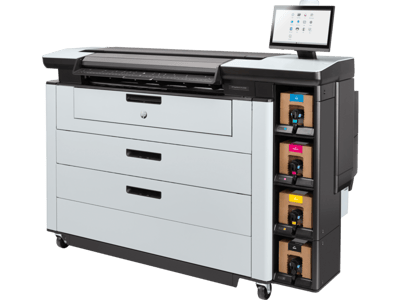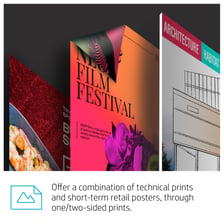In a previous post, I talked about "color vs. black & white" print technologies and some of the concerns or topics that lead to a decision within companies and firms. Today I would like to share some of the reasons why you should consider upgrading your wide-format printers, plotters, and multifunction systems—Print/Scan/Copy.
So often I hear from our customers that the printer is working "good enough" for the majority of work we do. However, they have come to live with the shortcomings of their current equipment or are unaware of what new technology has to offer.
I have outlined a few topics of interest and concern regarding why it might be a good time to consider new technology.
+Concern — too costly
-The alternative — have you researched the current pricing of new technology? With our cost per print plan, it can be much lower than older technology and typically lower maintenance cost for new vs. old, you might be surprised with the ROI. To learn more about our solution offerings, support and programs, contact me @ 800-873-7238 x2163 or email: terry.frisk@mastergraphics.com.
+Security — STAY ONE STEP AHEAD OF EVOLVING THREATS
Most companies are continuously creating confidential, valuable data that are crucial to running your business. And you're probably using multiple security methods—including authentication, encryption, and monitoring—to protect this data on your PCs, networks, and servers. But is your printing and imaging environment as secure as the rest of your infrastructure?
-The alternative — Print security can be complicated. HP Security Manager makes it simple to take device management off your to-do list and protect at-risk printers by establishing policies, automating fixes, and maintaining ongoing compliance.
To help keep your business protected, you need a solution that simplifies and strengthens security throughout your printing and imaging environment, saving your business time and money that can be better spent elsewhere. Learn more about HP Wolf Security.
+Quality — with the new technology from HP, whether it be the traditional DesignJet series printers or their new PageWide technology there is no comparison in the image quality that is built into today's HP technology. Whether you are printing construction or mechanical drawings (fine lines) to GIS maps (area fills and grayscale), to architectural renderings, to marketing material to include posters and banners on specialty media. Whatever the application there is no comparison to the current print head technology that creates the WOW factor! Not to mention the cost savings.
-The alternative — poor quality, hard to read prints, no eye-catching splash with faint colors. The "good enough" mentality of not knowing what is available.
+ROI — Return On Investment — with the increased cost in maintenance on old technology and less efficient print head technology as well as the rising cost of ink it doesn't take long to see a payback for the initial investment, not to mention the efficiency in time saved per print as well as ease of use.
-The alternative — continue to pay higher maintenance, more frequent failures, loner downtime with the risk of not being able to get a part or support. Also, no support for current operating systems and applications.
+Functionality — with new technology there are so many advantages which include, the ability to Print/Scan/Copy from a single footprint device. The ability to have multiple rolls (up to 6 online rolls with some models) with auto-switching and paper sizing. The ability to print in different resolutions (draft, normal, quality). The ability to scan to multiple destinations like a mapped or shared network drive, a USB jump drive, and scan to email, just to name a few. New printers and multifunction systems range in size from 24" wide up to 63" with the ability to print on paper rolls from 11" to 63" in width. Not to mention hundreds of different media options to print on from standard bond, to photo-based (glossy, semi-gloss, satin, and matte finishes) to adhesive back, to Tyvek and canvas, fabric and poly banner material... these are just a few of the common media types used today as manufactures continue to develop and add to the list, with the ability to change paper rolls easily.
-The alternative — continue to print on your obsolete "good enough" printer.
+Efficiency — with new technology comes much faster processors onboard, faster and larger hard drives to RIP files faster. Also, the majority of the HP models have embedded "Abode" PostScript/PDF license, which is purchased from Adobe. This allows for much faster and more accurate printing of PDF files. HP also processes the file at the printer (freeing up the end-users PC to do other functions) unlike other manufacturers that process at the PC.
-The alternative — live with slow wait times or files that are unable to print.
+ Ease of Use – with new technology also comes improved ease of use. HP has simplified the replacement of supplies with easy-loading ink cartridges (recyclable) and paper rolls. They have also started including a great new print utility called “HP Click”, which simplifies the print submission process by simply dragging and dropping files into a queue for easy arrangement and page sizing. HP Click also includes a great viewer, so you can see how the image fits on the page.
- The alternative – continue to print from drivers – one print at a time hoping the rotation is correct.
+ Too slow – the traditional inkjet technology typically was too slow for production printing due to the limitations on how fast you can drive an ink carriage traveling back and forth across a roll of paper. With traditional inkjet technology, manufacturers could only drive a carriage-type technology so fast. Even the most current of technologies are limited to approx. 3 to 4 D-size (24x36) prints per minute.
- The alternative – HP Pagewide technology.
+ Color is too expensive – in the past, this is somewhat true. Traditionally you would have to purchase a toner-based technology to reach the production speeds required to meet the demands and deadlines. With that comes the higher cost of equipment and maintenance. Typically a toner-based color machine consists of 4 imaging devices or 4 drums, depending on the technology, which drives up the cost to maintain, not to mention downtime and reliability.
- The alternative - HP Pagewide technology - gone are the days of being too slow and too expensive! The wide-format Pagewide technology from HP is available in five different models, which provide prints speeds ranging from 6ppm (prints per minute) up to 30 ppm, depending on the model. As for the cost per print for all consumables (excluding paper, it ranges from $ 0.005 to $ 0.015 per square foot, again depending on the model.
Summary & Comparison – so when evaluating your wide format printing needs. Do your research and check out the actual costs and prints speeds of the new HP DesignJet and Pagewide technologies. I think you will be pleasantly surprised how well the technology and cost compare to your old black and white and even your color printer and don’t be surprised if the cost is less than what you are currently paying for your old B/W technology.





